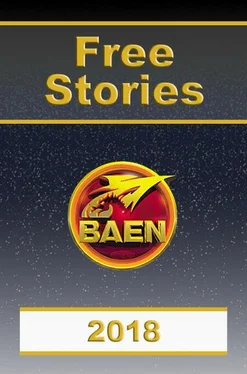"We’ve looked everywhere for him, Gavin," she said. "Everywhere we can fit without tearing the ventilation apart. There are pry-marks on the floor hatch that goes underground, but I can’t tell how old they are. He’s either in the shafts, or he’s—"
She didn’t finish the sentence. Titan was more forgiving than Mars—its 1.5 bar surface pressure meant they didn’t need the Martians' bulky pressurized suits—but a child without electrically-heated coveralls and closed-circuit air would certainly be dead by now.
"Okay," Gavin said. "I’ll stay on this channel. Let me know if you find him while I’m inside, and I’ll do the same if I find him holed up down there."
Gavin dropped from the table, fanning his wings halfway to the floor. He stepped to the vent, which Hope had opened. He wondered how long she’d yelled into the vent, praying for a response—how many times she’d tried to squeeze herself through the ninety-degree joints before calling for help.
He fluttered his wings again as he dropped into the darkness of the shaft, and landed on its floor, six feet below the surface.
"LED," Gavin commanded, and four tiny lights above and below his camera-eyes illuminated the horizontal shaft.
"Add overlay: underground ventilation."
Error M512 blinked in his visor. Overlay not found.
Dammit. I’m going to have to take notes so I don’t get lost down here. Why wouldn’t they put a virtual grid on the server when they dug the tunnels?
"Can you see where I am, Hope?" he asked through the radio.
"Let me check," she said. "No, sorry. The only locators anyone has are GPS-based, and our satellite constellation here is Gen 3. The ones around Earth are actually newer. There’s no underground repeater system either."
Guess I’m on my own.
Gavin walked straight ahead in the dimly-lit tunnel, with its roof scant inches above his head. He found it hard to believe a kid would escape by crawling down here.
"Jonah?" he called, but there was a limit to how loud the homunculus would make his voice. The bots hadn’t been designed for speeches or rock concerts, after all.
"Jonah?"
"Gavin?"
It was a woman’s voice though, and not Hope’s.
It took Gavin a second to realize it was Lori, and that he was hearing her voice through his own ears and not his synthetic ones.
Given how little she’d spoken to him in the last month, he excused himself for not recognizing her voice immediately.
Most long-duration spaceflight test groups experienced it—the emotional shutdown after months of confinement and sameness—so Gavin had poured himself into exploring while he waited for her to snap out of it. He was sure he’d get into a funk too at some point.
The homunculus stopped moving in the ventilation shaft.
"Hey, Lori," he said. "I’m—"
"You’re not building," she said. "I know you love burning up battery power flying around or methane-surfing before shift, but we really, literally, won’t have anywhere to live if we don’t get this shelter built. I can’t even get a ping-back for your location on the map."
In the ventilation shaft, the homunculus reached up to pull a non-existent helmet from its head. The shaft disappeared from Gavin’s vision, replaced by the cramped interior of the Goshawk 7 's command module. Communication and systems computer screens lined the four walls.
"Lori—"
"Gavin."
She stared at him, waiting for an answer.
"Jonah’s missing," he said. "Hope thinks he might be in the ventilation."
"If he is," Lori said, "he’ll come out when he gets hungry."
"What if he’s stuck or something?"
"Not really our problem," Lori said. "Just like building our house isn’t theirs. You know how this works—how it’s supposed to work."
* * *
It had been Hope’s idea, when Hub 1 was still in the draft stage. The problem of the sheer boredom and cabin fever of multi-year spaceflight had plagued scientists and science fiction writers for decades.
"So," Hope had said, "the current timeline goes: send robotic probes and workers, pilot them from Earth, then spend five years in boring transit, and start the rest of the work when we land. Right?"
Everyone else had nodded, not sure what she was getting at.
"What if we do the work while we’re flying? Quantum communication makes instantaneous control a possibility. Take the burden of robotic work off of mission control, and give it to the colonists during the long transit. It’ll save time and resources on arrival too, since we can tend a greenhouse before we even get there if we send bots with seeds. Once the main infrastructure is set up, every new crew will be responsible for building their own home before they arrive. We don’t know how much iron we’ll have—and we won’t have trees until we terraform—but the plastic bricks Ben designed are pretty easy to work with."
A few eyebrows had risen. Ben, the chief engineer, had been sitting across from her. His eyes had retained their hard skepticism.
"What kind of robotic vehicles?" he’d asked. "If you’re suggesting virtual reality, you’re also basically suggesting sending the same payload twice. Launching that much mass is a high-dollar proposition."
Hope had smiled.
"For one," she’d said, "robots in stasis don’t need to eat or breathe, so that’s half your payload gone. Since they’re inorganic, you don’t have to worry about lift-off force crushing them. You can launch the bots with a rail gun or whatever. They’d get there fast, and with renewable energy."
Ben’s head had wagged to the side, as he half-heartedly acknowledged her point.
"For two," she’d said, "we don’t have to make them full-size. Send homunculi, one for each—"
"Homunculi?"
"Tiny, little men," Hope had said. "I’m borrowing the term from psychology, and the shrinks borrowed it from alchemy. The sensory homunculus rides around in your brain experiencing the world. Maybe it’s just time to turn that inside out and let the homunculi do the walking."
"The thing that’s going to fry your motherboards—" another voice had said. All eyes had turned to Milton, the resident theoretical physicist. Milton had retired and come back from retirement so many times that at this point no one was certain whether he was getting paid to come to meetings, or just researching space for his own amusement. "Well, not your motherboards, perhaps, but your grandchildren’s—is when we build something a bit bigger than a Goshawk Heavy and push out for an interstellar transit at something approaching, say, fifty percent the speed of light.
"Perhaps we’ll have sent Hope’s homunculi ahead, as I hope we’ll agree to in this case, and they reach Betelgeuse before we do. With instantaneous communication and time dilation—since you’ll essentially be in two places at the same time—will you watch your tiny avatar move much faster than you, as you slog your way through the expanded time of a slower point of reference? Will it react to commands before you realize you’ve given them? What if we had an artificial neural processor in one plane, and humans in another? Could they think for a thousand years while their bodies only aged ten?"
Ben had laughed.
"Maybe we should worry about getting to Titan f—"
"Milton," Hope had said, "do you realize the next implication of what you’re suggesting?"
The old man had fixed her with an expression of patient curiosity, knowing she was prone to leaps of reason that took others hours to catch up to.
"Not yet," he’d said, "but I’m all ears."
"We can get information from the inside of a black hole," she’d said.
Читать дальше








![Тим Пауэрс - Последние дни. Том 2 [litres]](/books/393813/tim-pauers-poslednie-dni-tom-2-litres-thumb.webp)
![Тим Пауэрс - Последние дни. Том 1 [litres]](/books/394090/tim-pauers-poslednie-dni-tom-1-litres-thumb.webp)
![Тим Пауэрс - Последний выдох [litres]](/books/402145/tim-pauers-poslednij-vydoh-litres-thumb.webp)